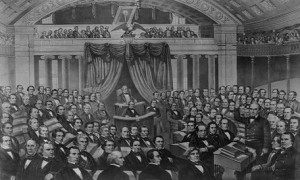 Last night was an interesting scene in the Senate, as Majority Leader Reid and Minority Leader McConnell got into some strategic maneuvering that resulted in the Senate overruling the presiding officer and setting a new precedent regarding dilatory motions post-cloture. The best write-up I’ve seen is Sarah Binder’s at the Monkey Cage, which also includes a helpful explanatory comment from Stephen Smith. I agree with both of them that what happened last night is not particularly analogous the “nuclear option” in the way that some media and blog commentators are likening it. There was no constitutional question addressed; the Senate simply set a new precedent. It may be a foreshadowing of things to come, but in and of itself it was a not-super-uncommon method for arriving at a new minor restriction in the post-cloture rights of the minority.
Last night was an interesting scene in the Senate, as Majority Leader Reid and Minority Leader McConnell got into some strategic maneuvering that resulted in the Senate overruling the presiding officer and setting a new precedent regarding dilatory motions post-cloture. The best write-up I’ve seen is Sarah Binder’s at the Monkey Cage, which also includes a helpful explanatory comment from Stephen Smith. I agree with both of them that what happened last night is not particularly analogous the “nuclear option” in the way that some media and blog commentators are likening it. There was no constitutional question addressed; the Senate simply set a new precedent. It may be a foreshadowing of things to come, but in and of itself it was a not-super-uncommon method for arriving at a new minor restriction in the post-cloture rights of the minority.
As quick as possible, here’s what happened: Cloture had been invoked. Reid and McConnell were negotiating for some amendments to come to the floor. A motion was made to suspend the rules so that a non-germane amendment — not normally allowed in this situation — could be offered. Reid made a point of order that a motion to suspend to the rules was dilatory under Rule XXII. On the advice of the parliamentarian, the presiding officer disagreed, and ruled that the motion was fine. Reid appealed the ruling, meaning that the Senate would vote to sustain or overrule the presiding officer. They overruled, which in effect sets a new Senate precedent that motions to suspend the rules are dilatory if offered post-cloture, and therefore can be struck by a point of order.
One pretty technical question someone asked me that I think is worth reviewing is this: why didn’t McConnell and the GOP filibuster the vote on the appeal of the ruling of the chair? There’s a pretty simple answer: the Senate was operating under the post-cloture rules of Senate Rule XXII, which include the following: Points of order, including questions of relevancy, and appeals from the decision of the Presiding Officer, shall be decided without debate. Under regular order in the Senate, McConnell could have prevented the vote on the appeal of the ruling, since (most) appeals are fully debatable. But because the Senate was operating under post-cloture rules, Reid could appeal the ruling knowing that the motion to appeal was not debatable, and thus would immediately be entitled to majority vote. Had a similar situation arose under regular order, Reid would have been in a much tougher situation. Since the appeal could be filibustered, that would have been a dead-end, since a stalemate would presumably have forced the Majority Leader to bargain and cave to some GOP demands.
The larger point for people to remember is that invoking cloture on something doesn’t end the proceedings; it simply activates the post-cloture rules as found in Rule XXII. Those rules, among other things, put a cap on total remaining debate (30 hours), allow only germane amendments that were written and filed prior to cloture, and empower the chair to dispense with certain dilatory motions. In practice, once cloture is achieved many of the Rule XXII rights (especially the right to 30 more hours of debate) are waived by unanimous consent. But if the minority wants to play hardball and/or make a point, they can drag out votes for quite some time after cloture is invoked. And that has consequences, particularly if there are multiple cloture motions that will have to be sequentially invoked in order to move the legislation.
